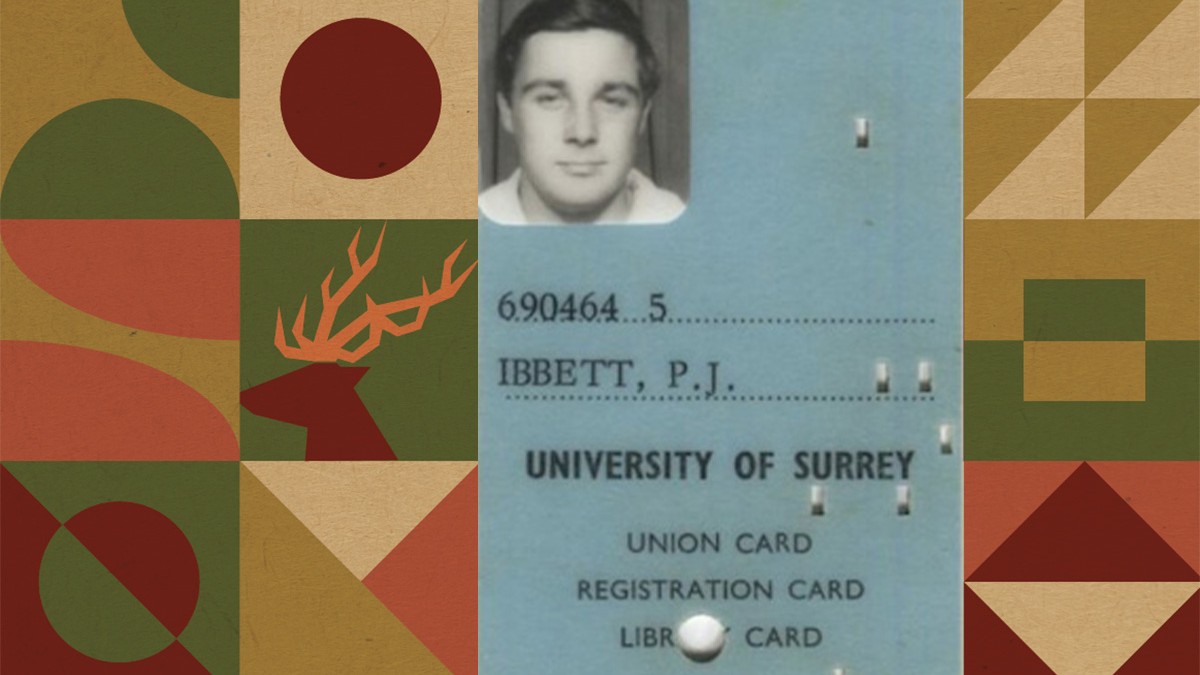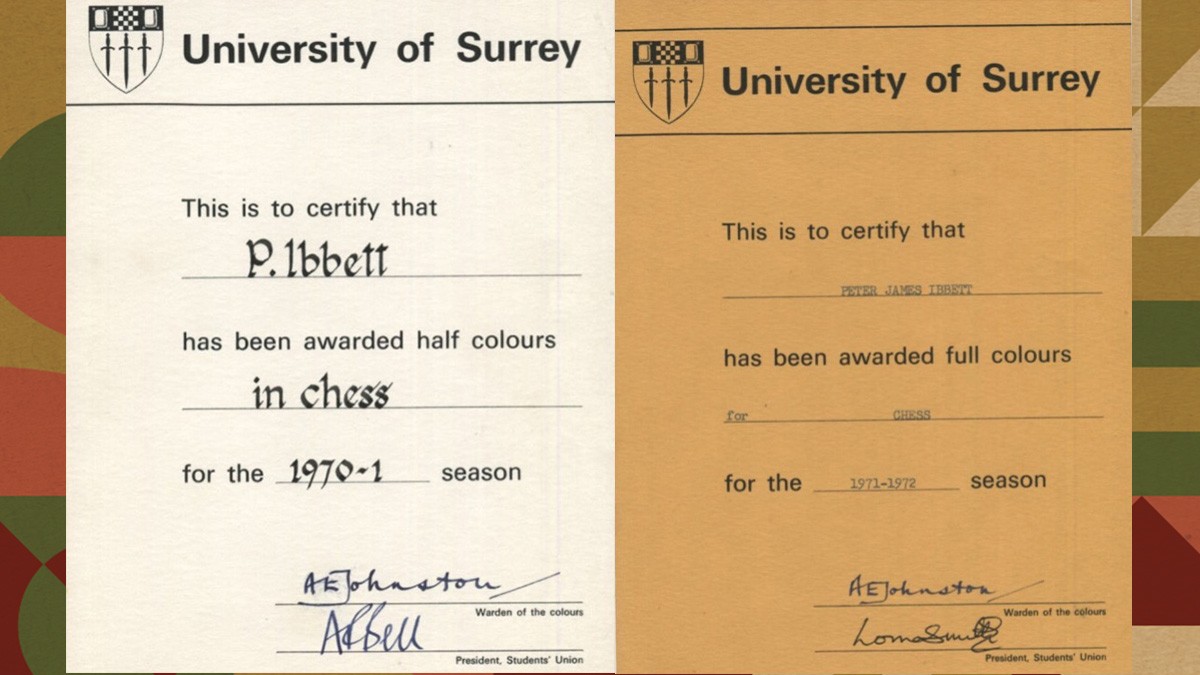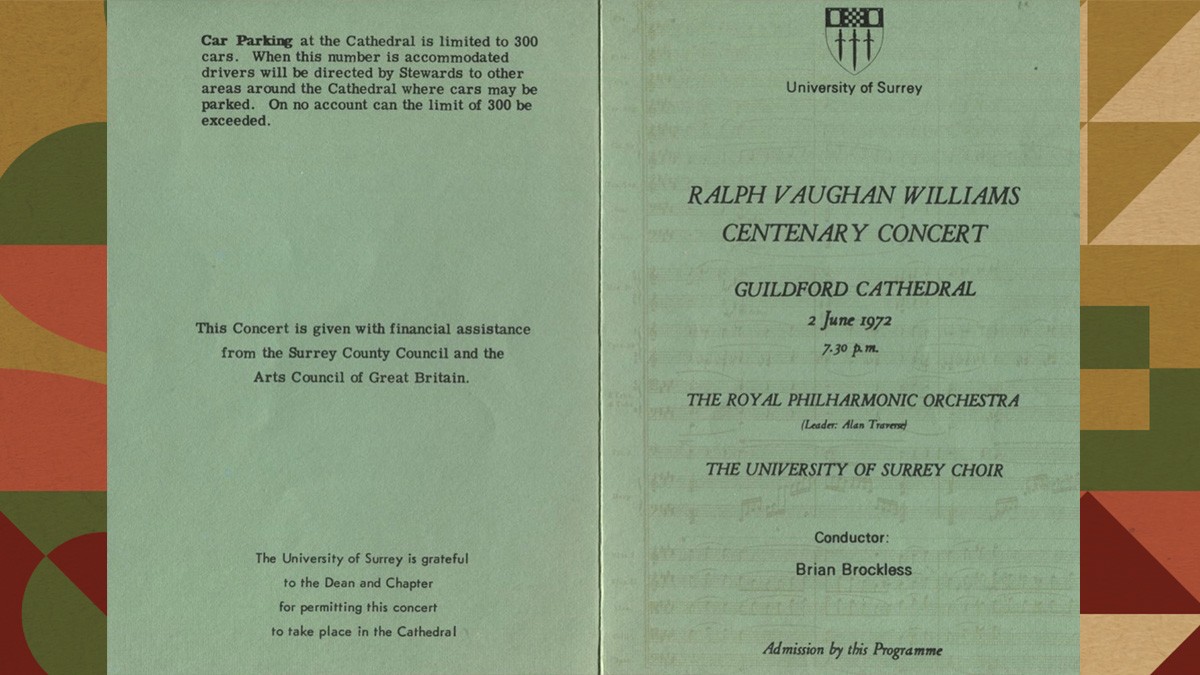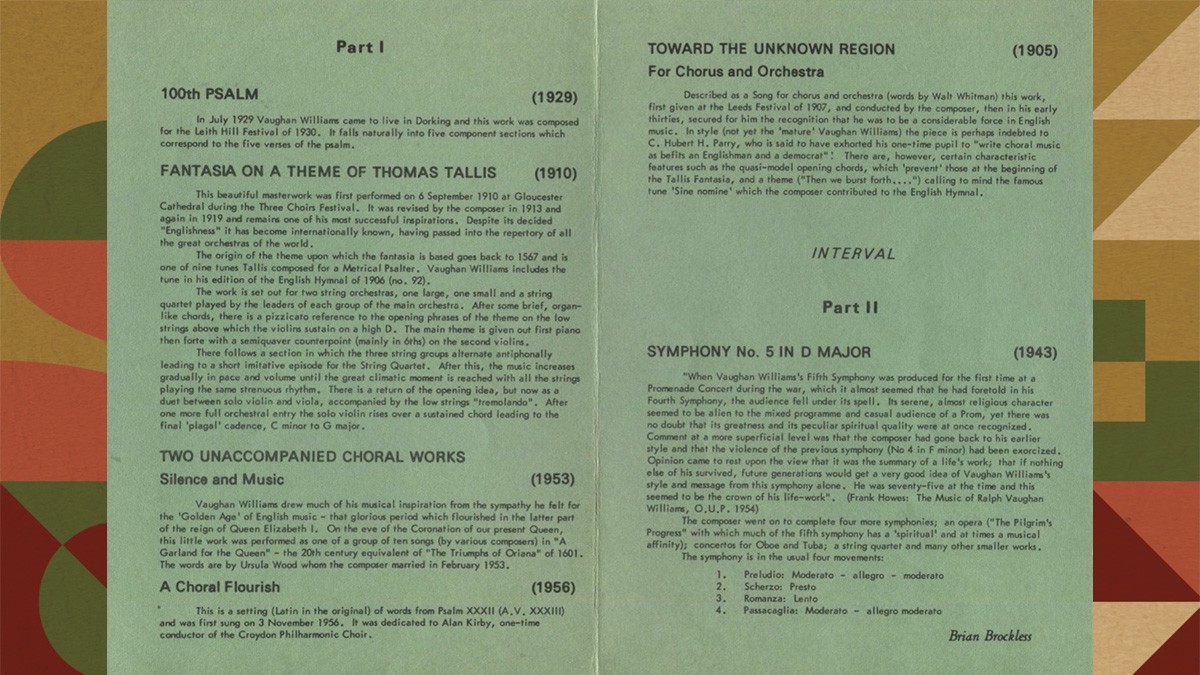“I was determined to be a foot soldier in the 1960s technological revolution...”
Peter Ibbett came to the University to study a BSc in Chemistry from 1969-1973. Alongside running the Chess Club, he developed a love of Ralph Vaughan-Williams… and saw a play that changed his life.

Peter's original student ID card from 1969
Why did you come to Surrey?
I passed the 11+ and I ended up in the local grammar school at Biggleswade. I had an aptitude in maths and sciences, and the only careers guidance I got was a 15-minute talk on how to apply to university. So I did that following my A levels.
What attracted you to Surrey?
I read the prospectuses of several universities and the red brick ones felt a bit formal. But there was a new tranche of colleges of technology that Harold Wilson’s Labour government had promoted, and I felt more in tune with the practical education they were offering. I liked the idea of being one of the foot soldiers in the new technological revolution.
I also liked Surrey because there was an emphasis that university wasn’t just about focusing on a specialist subject. There was an interest in developing the individual and widening horizons.
Why did you choose your particular course?
My parents ran an ironmongers shop, so I grew up with the smell of creosote and paraffin. The shop also had a Victorian chest of drawers that contained various paint pigments and chemicals. There were calcium carbide tubs in a store shed, too, which fed a mini cannon bird-scarer. This relied on being set off using the carbide and a spark from a flint ignited the gas. It stimulated an interest in science… especially if it made a BANG!
I recall having chemistry sets at home and leaving marks on the kitchen table after I’d conducted experiments. I found physics too esoteric and I wasn’t massively keen on cutting animals up in biology. So it was always chemistry for me.
What was it like to study at a new university?
It was partially constructed, but most of it was a building site. The main infrastructure, such as Senate House, the Library, the Lecture Block and two student accommodation courts, was built. But the rest of it, including the Students’ Union Building, was just foundations.
The facilities were new, though. My year was the first to use the laboratories in the Department of Chemistry. I remember people noticing a couple of our fumes cupboards didn’t seem to vent efficiently. This was investigated and they discovered the vent tunnel from the cupboards that went into the ceiling space had a concrete pillar built in the middle of it somewhere down the line. Nobody had thought to build around it! This was quickly rectified. I’m happy to report no students were poisoned.
What were the best bits of your degree?
The interfaces between chemistry, physics and biology were a source of fascination. The interdisciplinary nature of the subjects and how they could feed into one another was a key growth area that Surrey focused on. That was different to how the subjects were taught in a siloed way at the “red bricks”.
The applied focus of the subject was also attractive. For example, there was a concentration on how new technology could advance our understanding of other areas in industry.
Tell us about your year in industry…
I got the train from Guildford to Leatherhead where the power station water boiler outfit of the Central Electricity Board was based. My job in the lab was to road test a new technology called ion selective electrodes. This was used for measuring oxygen levels in the water used in power stations.
I had to benchmark the accuracy of this technology against the traditional method. It involved testing and calibration. That fed into my final year project.
Did you enjoy your time as a student?

Peter's nights at the Chess Club made him lots of mates – and won him colours for representing the University
Guildford campus was great. It was quite an international community with students from places such as Iran. This offered the chance to learn about other people and their cultures.
At the grammar school, myself and a friend ran a chess club and we entered a team in the Sunday Times National Chess Tournament. At Guildford, I joined the Chess Club and, within a month of starting my course, I ended up as Club Secretary. That pleased the incumbent who left me to it!
We played in leagues in the local area and we went to a big tournament in Birmingham, where I was soundly beaten by another student who became Britain’s first Grandmaster. We also organised a congress for the Surrey Borders Chess League in the local area using the campus facilities.
You developed a love of classical music, too…
We had to undertake a General Studies course as part of widening our educational knowledge outside our chosen degree subject. When I found out Guildford had an orchestra, I used the opportunity to give myself a thoroughly good education in classical music.
I also enjoyed attending lots of other talks and events. I remember one debate where the virtue of the scientific method was discussed. A staff member of the physics department sadly supposed he might have to hand in his resignation as he relied upon leaps of imagination and insight rather than logical deduction from accurate data!
There was also a lively political scene with regular debates. I recall Tony Benn coming to discuss the coal industry with Lord Robens, who was the Chairman of the Coal Board and the University Chancellor. The leader of the Socialist Society at the University stood up to denounce the capitalist exploitation of coal industry workers, and Lord Robens shot him down in flames on the facts of the situation.
Did you attend any student gigs?
My student accommodation was next door to the Main Hall where they held a lot of gigs, but I was never very interested in that scene. About half of the student population enjoyed the gigs, but the other half of us were more interested in quietly going about our business and doing other things. I was more interested in listening to the Guildford Philharmonic Orchestra in town.
What was Guildford like?
It was a lovely place. You could wander into town in 10 minutes and a few shops offered student discounts. There were also nice walks in the countryside around the Hog's Back.
I saw plays at the Yvonne Arnaud Theatre, including classics such as Lady Windermere’s Fan by Oscar Wilde and more recent fayre. One of the latter inspired me to think about a career in education.
It was a drama called The Effect of Gamma Rays on Man-in-the-Moon Marigolds, which was by a one-time science teacher called Paul Zindel. It was about two sisters. One was a bit scatter-brained and the other became interested in science by studying marigold seeds that had been in a nuclear reactor. The drama was about the latter realising that she didn’t have to be like her sister and that science offered a route out of her current life.
I discussed that play when I applied to study for my Postgraduate Certificate in Education. I used it as an example of how I could employ other disciplines to help educate people in more entertaining ways.
What are your key memories?
I enjoyed a consistently good level and range of experiences on offer, and I managed to enjoy those and complete my degree.
I remember going to Guildford Cathedral for a concert celebrate the centenary of the birth of Ralph Vaughan Williams, which included the University Choir. My love of classical music and that composer in particular grew during that period. But there were lots of similarly rich experiences during that time.
What did you do when you graduated?
There was an economic downturn, so securing science and technology jobs was difficult. I was a generalist rather than a specialist, too.
At that time, comprehensive education was coming in and I was interested in a career in teaching. There was also a new technology involving video cameras as a teaching aid being trialled. I went to Sheffield to see how this worked, and I did a trick that involved floating a needle on water to entertain the school kids who’d come up for this trial. The lecturer overseeing it was complimentary about how I entertained and educated these youngsters. That convinced me I could teach.
You went into teaching?
I took a job at a college in Cambridgeshire as a chemistry teacher. I adopted a practical approach to teaching the subject by first showing the pupils how to use the lab equipment. I then moved to a nearby college as a Head of Chemistry.
Sadly, the National Curriculum arrived in the mid-1980s and gradually turned teaching into a job about delivery of targets rather than using your skills to enable pupils to enjoy exploring science. I spent the last six years of my career from 2004 to 2010 setting up an after-school tuition franchise where all my accumulated skills helped pupils regain confidence after being expected to jump through one-size-fits-all educational hoops they weren't ready for.
I taught groups that included a six-year-old who’d been expelled from school, an acephobic nine-year-old and several other challenging students. I could help them learn because I had the background to intrigue, inspire and entertain. I could no longer do that within the confines of the National Curriculum. It was a nice way to round off my career.
I also helped establish a local history society in 1977. Five years ago, we secured funding to set up an archive room. Hearing people talk about themselves and their own experiences is always fascinating.
What advice would you give the undergraduate version of yourself?
Take as many of the opportunities on offer as possible. Don’t regard going to a university as just learning in your specific subject area. It’s broader than that. Involve yourself in as much of the wider community as you can. You never know what you may discover and how that will enrich your life later on.
Visiting the Yvonne Arnaud Theatre, for example, and watching the Paul Zindel play inspired and influenced my choice of career. So involve yourself in a wide spectrum of activities.
And don’t forget to enjoy yourself.

